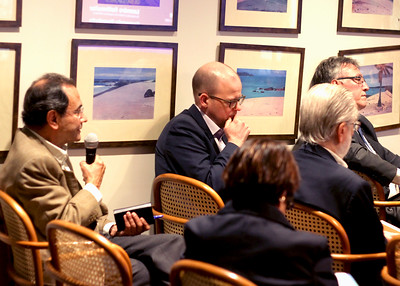Asia currently trades more interregionally than with the rest of the world. This was one of the main topics discussed at the roundtable "Asia in Numbers", which took place on the 4th of September at CEBRI. The Chief Economist of Capstone Partners, Leandro Rothmuller, and the Chief Economist of BOCOM BBM, Fernanda Guardado, gave presentations, which were mediated by CEBRI Trustee, Anna Jaguaribe.
In general, despite the abundant diversity in the region, all countries have grown significantly in recent years. The trends in the Asian region have the potential to transform world trade because of Asian corporations' notable emergence, their leadership in launching digital innovations globally and regional consumption being a major vector for economic expansion, even more than exports.
Date:
September 04, 2019
Location:
Rio de Janeiro, CEBRI
Language:
Portuguese only
Share
Asia currently trades more interregionally than with the rest of the world. This was one of the main topics discussed at the roundtable "Asia in Numbers", which took place on the 4th of September at CEBRI. The Chief Economist of Capstone Partners, Leandro Rothmuller, and the Chief Economist of BOCOM BBM, Fernanda Guardado, gave presentations, which were mediated by CEBRI Trustee, Anna Jaguaribe.
In general, despite the abundant diversity in the region, all countries have grown significantly in recent years. The trends in the Asian region have the potential to transform world trade because of Asian corporations' notable emergence, their leadership in launching digital innovations globally and regional consumption being a major vector for economic expansion, even more than exports.
